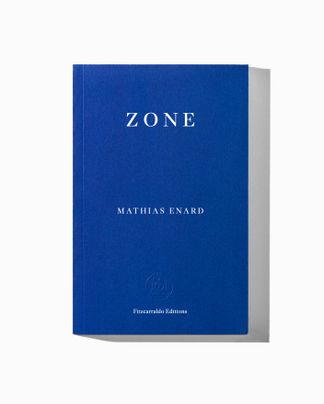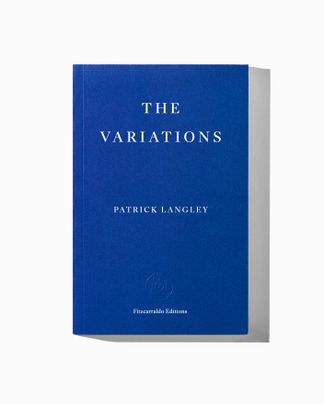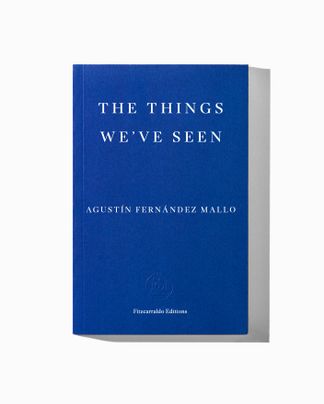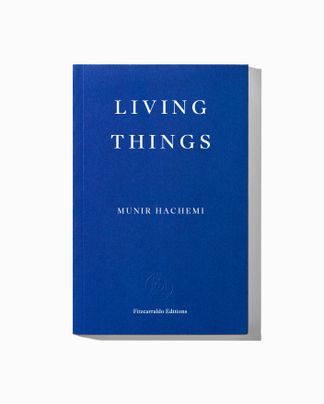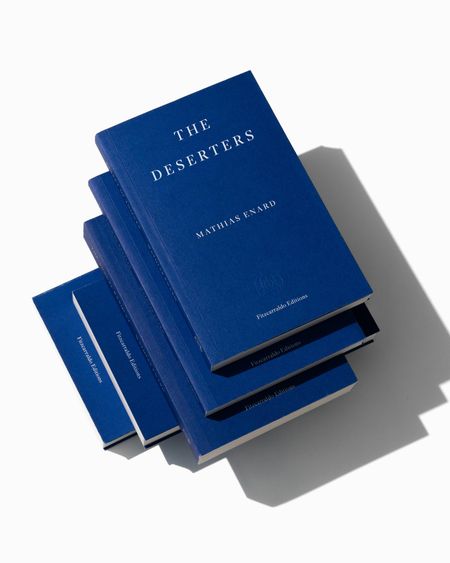To research his thesis on contemporary agrarian life, anthropology student David Mazon moves from Paris to La Pierre-Saint-Christophe, a village in the marshlands of western France. Determined to capture the essence of rurality, the intrepid scholar shuttles around on his moped to interview local residents. Unbeknownst to David, in these nondescript lands, once theatres of wars and revolutions, Death leads the dance. When an existence ends, the Wheel of Life recycles its soul and hurls it back into the world as microbe, human or wild animal, sometimes in the past, sometimes in the future. Only once a year do Death and the living observe a temporary truce, during a gargantuan three-day feast where gravediggers gorge themselves on food, libations and language. Brimming with Mathias Enard’s characteristic wit and encyclopaedic brilliance, The Annual Banquet of the Gravediggers’ Guild is a riotous novel where the edges between past and present are constantly dissolving against a Rabelaisian backdrop of excess – and a paradoxically macabre paean to life’s richness.
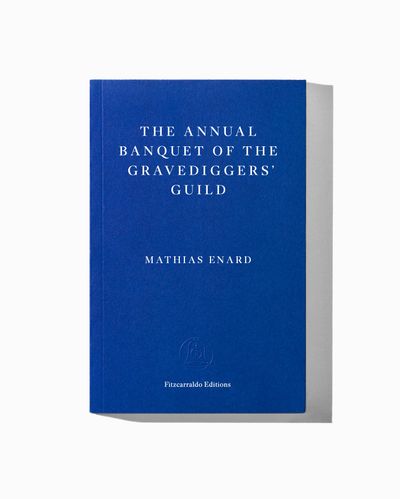
The Annual Banquet of the Gravediggers’ Guild
Translated by Frank Wynne
French paperback with flaps, 496 pages
Published 4 October 2023
The Annual Banquet of the Gravediggers’ Guild
Translated by Frank Wynne
‘Whichever way a man may turn,
his eyes alight upon Libourne.’
— Onésime Reclus, Le Partage du monde
11 December
Needless to say, I have resolved to name this place the Savage Mind.
I arrived two hours ago. I don’t yet know quite what I’m going to write in this journal, except, well, impressions and notes that will make up an important part of my thesis. My ethnographer’s jotter. My field notebook. I took a taxi from Niort train station (heading north-north-west, fifteen kilometres, a small fortune). To the right of the road, flat open country, boundless fields, no hedgerows, a little cheerless in the gathering dusk. To the left, we were skirting the dark shadows of marshland, or that, at least, is how it seemed to me. The driver had a hell of a time finding the address, even using sat-nav. (Coordinates for the Savage Mind: 46°25’4”N, 0°31’29.3”W.) Eventually, he pulled into a farmyard, a dog began to bark, I was here. The owner (sixty, smiling) is called Mathilde. I took possession of the premises. My house (my apartment?) is, in fact, the rear ground floor area of the main farmhouse. The windows look out over the garden and the kitchen garden. To the right, I have a view of the church; to the left, a field (I don’t know what’s growing in it – lucerne? I often assume that all fields of green low-growing crops are lucerne) and, opposite, rows of what I suspect are radishes or cabbages. A bedroom, a kitchen-living room, a bathroom, that’s all, but it’s more than enough. My feelings, when Madame Mathilde said, Right then, there you go, this is your place, were mixed. Simultaneously happy to finally be in the field and a little anxious. I rushed to my laptop to make sure the Wi-Fi worked, using my
article for Studies and Perspectives as a pretext. I was only duping myself; there was nothing urgent. I mostly sent some messages and chatted with Lara. I went to bed early, reread a few pages of Malinowski and, in the darkness, was keenly aware of the aural environment. The muffled hum of some contraption in the distance (the boiler?), from time to time an even more distant car. Then I went to sleep on an empty stomach. I really need to sort out the transport issue and buy some stuff to eat.
12 December
First day acclimatizing to my new terrain. La Pierre-Saint-Christophe marks the centre of a triangle whose vertices are Saint-Maxire, Villiers-en-Plaine and Faye-sur-Ardin. So many fantastical names that give substance to my New World. Fifteen kilometres from Niort, ten
from Coulonges-sur-l’Autize.
I left the Savage Mind shortly before 10 a.m., having realized that I was not alone in my ethnographer’s quarters: there is a plethora of fauna. Doubtless, the toad is drawn by the countless insects and the cats by the toad. In the bathroom, equidistant from the shower and the toilet, is a colony of red worms, or rather living red filaments that look like worms. Quite cute, as long as you don’t step on them. They slowly slither towards the door, so you have to spray them down the plughole before taking a shower. I easily managed to overcome my disgust, which is a reassuring sign of my ability to deal with the difficulties of fieldwork. After all, even Malinowski notes that insects and reptiles are the principal obstacles to the work of the ethnologist. (Since no-one will read this diary, I might as well admit that I was pretty disgusted at the thought of worms in the bathroom and it was fifteen minutes before I steeled myself to take a shower.) There is also a handsome caravanserai of dwarf snails, which is harmless enough. I assume that the humidity, together with being at garden level, are mostly to blame. So anyway, I left the Savage Mind at around ten o’clock and went to see my landlady, Madame Mathilde, to ask if there was some way of getting into town so I could stock up the larder, she looked tremendously surprised, Well, now, I’ve no idea, she had no idea, she had no idea whether there was a bus service to the village. (Today, I discovered that it’s possible to take the early morning school bus, but I’d look like a dirty old man and besides, I would have to wait a good two hours for the supermarket to open, something to note in the Transport chapter.) Mathilde immediately advised me to buy a car: in La Pierre-Saint-Christophe, there is nothing except a café that sells basic essentials, which, around here, means fishhooks, cigarettes and fishing permits. But at least I won’t have to fish for my breakfast: Madame Mathilde (or rather her husband, Gary, keen to interview him) was kind enough to lend me an old moped belonging to one of their children (note for the Transport chapter) and an old black helmet with no visor and threadbare padding decorated with a few vintage stickers (a frog sticking its tongue out, an AC/DC logo). As a result, I have a somewhat precarious but efficient means of locomotion. Towards midday, I went to the supermarket in the county town, Coulonges-sur-l’Autize (pretty name), and bought lots of things before it occurred to me that it wouldn’t be easy to carry them on a moped: tins of tuna and sardines, frozen pizzas, coffee, a little something sweet (chocolate). The departmental road (number something or other) twists and turns on its way to the town, crossing quite a wide river. (The Autize?) A market, a post office, a church, a small château, two boulangeries, as many pharmacies, a clothes shop, three cafés; there’s not much to see. I bought a newspaper in order to look nonchalant in the Bar des Sports and drank tea while eavesdropping on conversations, my way of initiating contact with the place. The local dialect (officially Poitevin-Saintongeais – I wouldn’t like to offend anyone) is probably dying (but let’s not get ahead of ourselves: Tongues chapter, lovely title). I hope to have more luck at the market. After tea I headed back to the Savage Mind; thanks to a stray dog, I almost crashed into a low wall and totalled the moped (there’s a sentence I never thought I would write) but, by some miracle, I managed to right the bike in time. Then I went over my work schedule. La Pierre-Saint-Christophe has six hundred and forty-nine inhabitants, according to the latest municipal census. Two hundred and eighty hearths, as old timers would say. The demonym, according to Wikipedia and the mayoral website, is Petrochristophorian. Esteemed Petrochristophorians, ladies and gentlemen, I have decided (Questions chapter) to conduct about a hundred interviews from among your number, choosing interviewees such that, by the end, I will have equal numbers for each gender and age bracket. This seems to me, empirically, a good idea. A year’s work subdivided into two six-month campaigns. Great. I feel full of energy. I skimmed though the rough draft of my article for Living Rural Lives and immediately had my first intuition. Evidently, working in the countryside suits me.
(…)
Guardian Books of the Year 2023 | New Yorker Books of the Year 2023
‘Enard is a writer of singular talent…. Just buy it and open up the field diary of a pretentious young man in the arse-end of nowhere in France, and see what a really great writer can do with almost anything.’
— John Phipps, The Times
‘Énard is wickedly, brilliantly, subversive of sanctity…. Despite its macabre title and subject matter, this novel is a capacious celebration of life, love and language.’
— Ruth Scurr, Guardian
‘The Annual Banquet of the Gravediggers’ Guild is an earthy, Rabelaisian riot of a novel, dripping with slime, bugs, gluttony, death and bawdy decay…. It is a dizzying concoction, which almost topples under its own inventive weight. In the end, though, it is held together by David’s own story which, like Maître Susane’s, carries a surprising tenderness.’
— Sophie Pedder, Economist
‘[T]he real story becomes history, the fluidity of time, the democratizing powers of death, and – through a stew of Buddhist, Christian and Islamic philosophies – the cyclical jumble of life. This is Énard at his best, calling to mind the erudite historical sweep of his 2008 debut, Zone.’
— Martin Riker, New York Times
‘When French gravediggers gather for their annual banquet in Mathias Enard’s magnificent new novel, they banish the ghosts by feasting on a grand, Rabelaisian scale…. In The Annual Banquet of the Gravediggers’ Guild the focus shifts from the macroscopic to the microscopic, opening up La Pierre-Saint-Christophe to the relentless fractal curiosity of a writer fascinated by the depths of the infinitely small. The epic nosh-up, hosted by the local undertaker Martial Pouvreau, allows Enard to engage in an alternative history of France, looking to the inexhaustible resources of the provinces rather than to the gilded stories of the metropolis. The challenges for the translator of Enard’s remarkable novel are endless from the rendering of punning proper names to the encyclopedic survey of French gastronomy and the capture of French dialect speech. Frank Wynne, the prize-winning Irish translator, proves himself more than equal to the task and ensures that, for English-readers, the invitation to the banquet leaves us hungry for more.’
— Michael Cronin, Irish Times
‘Recklessly, omnisciently, dazzlingly, Mathias Enard over the last twenty years has been inventing one of the most visionary oeuvres in French literature. In this book, by excavating a remote rural corner and inhabiting in turn every living thing there, man, woman and beast, he gives us the gift of deep verticality, where a sentence spools into other sentences, other stories, other epochs, and resolves into a history of Europe.’
— Jeet Thayil, author of Names of the Women
‘Mathias Enard is one of the best contemporary French writers, and his works – ambitious, erudite, multifaceted, surprising and unconventional – are always worth reading, because they always strike a perfect balance between the best that literature can offer: pleasure and knowledge.’
— Javier Cercas, author of The Impostor
‘Every novel by Mathias Enard reminds me of the reasons why I read fiction. He is ambitious, erudite, full of life, and a wonderful stylist to boot. He is one of the great novelists of our time.’
— Juan Gabriel Vásquez, author of The Shape of the Ruins
‘Mathias Enard is an immensely ambitious writer…. Fortunately, his ambition is matched by an equally extraordinary talent. His elegant prose … is admirably precise and intellectually limpid – he makes no concessions.’
— Alberto Manguel, El País
‘All of Enard’s books share the hope of transposing prose into the empyrean of pure sound, where words can never correspond to stable meanings. He’s the composer of a discomposing age.’
— Joshua Cohen, New York Times
‘A novelist like Enard feels particularly necessary right now, though to say this may actually be to undersell his work. He is not a polemicist but an artist, one whose novels will always have something to say to us.’
— Christopher Beha, Harper’s
‘The most brazenly lapel-grabbing French writer since Michel Houellebecq.’
— Leo Robson, New Statesman
‘Rarely has a book about death been so joyful…. With The Annual Banquet of the Gravediggers’ Guild, Mathias Enard offers up both the most excessive and the most consolatory novel written in a long time.’
— Florence Buchy, Le Monde
‘Although his focus here is on the Poitevin marshes, Mathias Enard remains above all an explorer who is peerless in his ability to join together places, cultures and epochs, always returning to love, to death and to what they can generate together.’
— Baptiste Liger, Lire
‘A baroque, Rabelaisian tale…. Mathias Enard’s pen and unbridled imagination lead the saraband, the bacchanalia, until we’ve had our fill.’
— Thierry Clermont, Le Figaro
‘A wonderfully unclassifiable novel. Contemporary, historical, comical, truculent, poetic, with elements of the diary, the fable, the short story … The Annual Banquet of the Gravediggers’ Guild is shot through with Mathias Enard’s deep love of literature.’
— Muriel Mingaud, Centre France
‘This is a book that elicits a visceral response from the reader.’
— Josh Zajdman, Washington Post
Mathias Enard, born in 1972, studied Persian and Arabic and spent long periods in the Middle East. He won several awards for Zone, including the Prix du Livre Inter and the Prix Décembre, and won the Liste Goncourt/Le Choix de l’Orient, the Prix littéraire de la Porte Dorée and the Prix du Roman-News for Street of Thieves. He won the 2015 Prix Goncourt, the 2017 Leipziger Book Award for European Understanding, the Premio Gregor von Rezzori and was shortlisted for the 2017 International Booker Prize for Compass.
Frank Wynne has translated works by authors including Michel Houellebecq, Patrick Modiano, Virginie Despentes and Jean-Baptiste Del Amo. His work has earned many awards, including the IMPAC Prize, the Independent Foreign Fiction Prize, and the Premio Valle Inclán.

